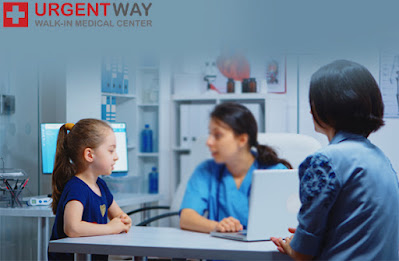When do you need urgent pediatric care?
Both pediatric urgent
care centers and ERs (emergency rooms) provide acute medical care. These are
both options when your child needs urgent medical attention. So, when your
child is sick or injured, how do you know which to choose—pediatric urgent care
or the ER? Here are some general guidelines.
What does urgent care
for children provide?
In some areas, you can
find specialized children's urgent care. But even conventional urgent centers
can help children with acute medical needs. The level of assistance the centers
can provide varies. Some urgent care centers can treat more serious conditions
than others.
- Animal bites, minor bone fractures, minor burns, and
cuts that require suturing (stitches)
- Cough, sore throat, high fever, and flu
- Ear pain, sinus pain, eye problems, minor headache, and
minor difficulty breathing
- Itching and skin problems
- Minor sports injuries.
- Urinary tract infections
- Vomiting, diarrhea, and abdominal pain
Usually, an urgent care center can perform minor
diagnostic tests, such as X-rays and lab tests. In addition, minor treatments may be performed, such as sutures or
foreign body removal. However, it does not support extensive tests or
procedures. Sometimes, it can be challenging to know if your child needs more
than immediate care before you get there. Make sure we introduce you. You can
also call an ambulance if necessary.
What does pediatric
emergency care provide?
In a true emergency,
the ER is the safest place to take your child. This includes:
- Broken bones with deformed limbs, open wounds, or bones
that have penetrated the skin
- A deep cut or wound that does not stop bleeding after
15 minutes of pressure
- Difficulty breathing, confusion, or excessive
sleepiness
- Seizure, head injury, difficulty walking or standing,
or neck stiffness with headache and fever
- Severe burns or severe allergic reactions
- Hematemesis or severe or persistent vomiting or
diarrhea
In other situations,
bringing in paramedics is the safest option. They can assess the condition and
begin treatment on the way to the hospital. Ambulances can safely handle
traffic jams and delays.
Call 911 if your child's condition may
worsen while at the hospital or if your child:
- Stopped breathing or suffocating.
- Ingested potentially toxic substances including drugs,
vitamins, cleaning products, or any substance not intended for human
consumption.
- lost consciousness
- Possible neck or spinal cord injury
- Seizures that last longer than three minutes.
At an urgent care center, your child will be cared for by a provider who specializes in providing
quality care. About 70% of doctors working in emergency medical centers are
specialists in emergency medicine or family medicine. Therefore, emergency
treatment is an expensive option for appropriate situations.





Comments
Post a Comment